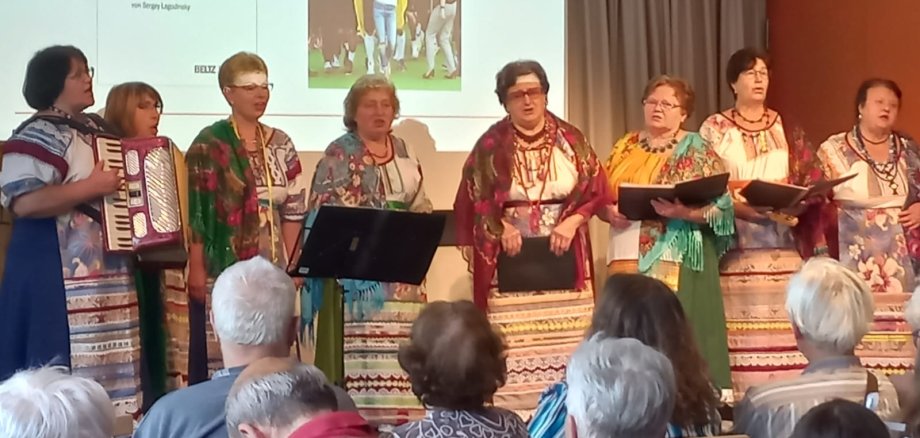Lecture on opinions of Russian-Germans on the Ukraine war
"Are Russian Germans for or against the war in Ukraine?" This question has certainly been asked by many people in Germany since Russia's war of aggression against its neighbouring country. Post-Soviet migrants have often been accused of having a Putin-friendly attitude, and cases of hostility towards Russian speakers have also become known.
In order to dispel or at least prevent such prejudices, the DEXT (Democracy Promotion and Extremism Prevention) and Migration and Integration departments of the district and the Waldeck-Frankenberg Network for Tolerance organised a lecture followed by a discussion. In the course of autumn, another round of discussions is planned to maintain the dialogue that has been started. The event was musically accompanied by the Korbach choir "Singende Frauen" ("Singing Women") under the direction of Irina Hazke; with Russian and Ukrainian songs and traditional costumes, the choir brought the participants closer to a small piece of the cultural diversity of the Russian Germans.
Speaker Dr Jannis Panagiotidis - a native of Korbach, now deputy director of the Research Centre for the History of Transformations at the University of Vienna, expert in the topic of post-Soviet migration - made it clear that the vast majority of Russian Germans were neither on one side nor the other of the two warring parties. "The war has come to people's living rooms," Panagiotidis quoted a Russian-speaking interviewee. A connection between media consumption and positioning is recognisable.
However, according to surveys, only 17-20 per cent of consumers of Russian media in Germany have a clear pro-Putin stance. According to Dr Panagiotidis, the majority of post-Soviet migrants find it difficult to take a position. German and Russian media are consumed to the same extent.
A great deal of concern and diversity of opinions among German-Russians became clear at the lecture event. Several post-Soviet migrant women spoke up and described their turmoil in this conflict. "We all speak the language of the former Soviet Union," explained one participant. It is impossible for her to speak clearly for the Russian or Ukrainian side - relatives live in both countries. However, this is what Dr Panagiotidis highlighted as positive "civil society mobilisation". Many post-Soviet migrants got involved with the Ukrainian refugees, supported them with translations and by collecting humanitarian aid. In this way, they sent a clear signal against the Russian war of aggression.
